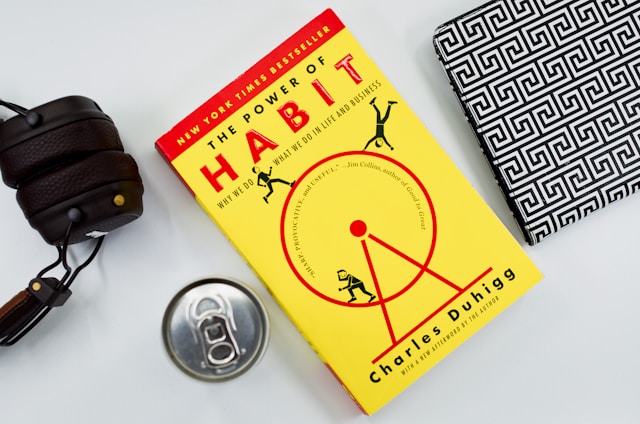Your brain is working against you—here’s how every bad habit is setting you up for failure (and what you can do about it).
You ever catch yourself reaching for that packet of crisps or skipping the gym “just for today” and think, “It’s no big deal. I’ll get back on track tomorrow?”
We’ve all been there. But here’s the scary truth: every time you repeat that bad habit, your brain is rewiring itself to make it easier for you to fail again.
It’s called the Habit Trap, and it’s more dangerous than you think. You might feel like you can turn things around whenever you want, but each time you indulge that negative behavior, your brain builds stronger pathways that make it harder and harder to break free. Before you know it, what felt like a “one-off” indulgence has become part of your routine.
Of course, it doesn’t have to be this way. Let’s break down how the Habit Trap works—and, more importantly, how you can reverse it before it takes over your life.
Tip #1: Your Brain is Hardwired for Routine (Even the Bad Ones)
Our brains are incredible machines—built for efficiency. The problem? They don’t care if the habit they’re reinforcing is good or bad.
Psychologist Charles Duhigg, author of The Power of Habit, explains how habits are formed in a three-step loop: Cue → Routine → Reward. Over time, this loop becomes automatic, with your brain looking for shortcuts to conserve energy. That’s why you don’t have to think twice before reaching for junk food or skipping a workout.
The more you repeat a bad habit, the stronger that neural pathway becomes. It’s like building a superhighway in your brain for failure.
The good news? This same loop can be hacked. By identifying the cue that triggers your bad habits (stress, boredom, etc.), you can start to replace the routine with something healthier. Your brain will follow the path you set.
Tip #2: Every Bad Habit Weakens Your Willpower
You might think that skipping one workout or eating that unhealthy snack won’t do much damage, but every time you give in to these urges, you’re depleting your willpower. What’s even worse: willpower is like a muscle—the more you strain it, the weaker it gets.
According to research by Roy Baumeister, a leading psychologist in the field of self-control, willpower is a finite resource. The more decisions you make in a day (especially around avoiding bad habits), the more you drain your ability to resist temptation later on. This is why you might find yourself starting the day strong but giving in by the evening.
The more you let bad habits creep in, the more you condition your brain to take the easy way out. The solution? Structure your environment to minimize temptation and reduce the number of decisions you have to make. Set up your day to make good habits easier than bad ones.
Tip #3: The Danger of “Just This Once” Thinking
It’s easy to justify bad habits by telling yourself it’s a one-off—just this once. But the more often you say that, the less your brain sees the habit as a one-time thing and the more it starts to embed it into your routine.
Psychologist Wendy Wood, a leading researcher in habit formation, calls this “automaticity.” Every time you repeat a behavior, it becomes more ingrained until your brain processes it automatically, without needing conscious thought. This is why you can find yourself halfway through a bag of crisps before you even realize you’ve started.
Breaking this cycle requires mindfulness. Catch yourself before you slip into autopilot. The more aware you become of these moments, the easier it will be to stop the cycle and make conscious, healthier choices.
Tip #4: Bad Habits Lead to Negative Identity Shifts
The more bad habits you form, the more you start to view yourself through that lens. It’s not just about the bad habit—it’s about the way it rewires your self-image.
James Clear, author of Atomic Habits, explains that repeated behaviors influence our identity. If you consistently skip workouts or indulge in poor eating habits, you start to see yourself as someone who’s lazy or unhealthy. This creates a negative feedback loop, where your habits shape your identity, and your identity shapes your future actions.
To break out of this trap, start viewing yourself as the person you want to become, not the person your habits have turned you into. Tell yourself, “I am someone who takes care of my health”—then act accordingly. Repeated positive behaviours will slowly shift your identity back to where it should be.
Tip #5: Break the Habit Trap with Small, Consistent Changes
Now that we know how bad habits rewire your brain, the question is: how do you reverse the damage?
The answer is simple, but not easy: small, consistent changes. BJ Fogg, a behaviour scientist at Stanford, emphasises the importance of “tiny habits.” Start by replacing one small bad habit with a positive one. The key is consistency. The more often you perform a positive action, the more your brain rewires itself for success.
It won’t happen overnight, but the more you chip away at those bad habits, the weaker those old neural pathways become. Over time, you’ll build stronger, healthier habits that will guide your future actions.
Escape the trap
The Habit Trap is real, and it’s subtle. Every time you indulge a bad habit, you’re reinforcing it, making it harder to escape. But you’re not powerless. By understanding how habits work and making small, consistent changes, you can retrain your brain for success.
So, the next time you catch yourself about to slip, remember: it’s not just about this one moment. It’s about what you’re teaching your brain to do in the future. Break the cycle now before it locks you into a path you don’t want to be on.
Your future self will thank you.

